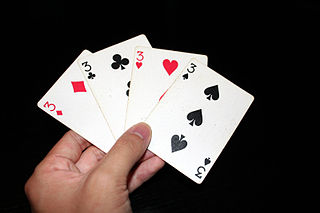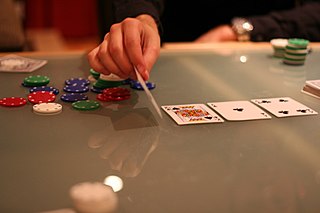
Blackjack is a casino banking game. The most widely played casino banking game in the world, it uses decks of 52 cards and descends from a global family of casino banking games known as Twenty-One. This family of card games also includes the British game of Pontoon and the European game, Vingt-et-Un. Blackjack players do not compete against each other. The game is a comparing card game where each player competes against the dealer.

Poker is a family of comparing card games in which players wager over which hand is best according to that specific game's rules in ways similar to these rankings. While the earliest known form of the game was played with just 20 cards, today it is usually played with a standard deck, although in countries where short packs are common, it may be played with 32, 40 or 48 cards. Thus poker games vary in deck configuration, the number of cards in play, the number dealt face up or face down, and the number shared by all players, but all have rules that involve one or more rounds of betting.
Pai gow poker is a version of pai gow that is played with playing cards, instead of traditional pai gow's Chinese dominoes. The game of pai gow poker was created in 1985 in the United States by Sam Torosian, owner of the Bell Card Club.

Baccarat or baccara is a card game played at casinos. It is a comparing card game played between two hands, the "player" and the "banker". Each baccarat coup has three possible outcomes: "player", "banker", and "tie". There are three popular variants of the game: punto banco, baccarat chemin de fer, and baccarat banque. In punto banco, each player's moves are forced by the cards the player is dealt. In baccarat chemin de fer and baccarat banque, by contrast, both players can make choices. The winning odds are in favour of the bank, with a house edge of at least 1 percent.
Five-card stud is the earliest form of the card game stud poker, originating during the American Civil War, but is less commonly played today than many other more popular poker games. It is still a popular game in parts of the world, especially in Finland where a specific variant of five-card stud called Sökö is played. The word sökö is also used for checking in Finland.
Seven-card stud, also known as Seven-Toed Pete or Down-The-River is a variant of stud poker. Until the recent increase in popularity of Texas hold 'em, seven-card stud was the most widely played poker variant in home games across the United States, and in casinos in the eastern part of the country. The game is commonly played with two to eight players, though eight may require special rules for the last cards dealt if no players fold. With experienced players who fold often, even playing with nine players is possible.

Texas hold 'em is one of the most popular variants of the card game of poker. Two cards, known as hole cards, are dealt face down to each player, and then five community cards are dealt face up in three stages. The stages consist of a series of three cards, later an additional single card, and a final card. Each player seeks the best five card poker hand from any combination of the seven cards; the five community cards and their two hole cards. Players have betting options to check, call, raise, or fold. Rounds of betting take place before the flop is dealt and after each subsequent deal. The player who has the best hand and has not folded by the end of all betting rounds wins all of the money bet for the hand, known as the pot. In certain situations, a "split-pot" or "tie" can occur when two players have hands of equivalent value. This is also called a "chop-pot".
Caribbean stud poker, also called casino stud poker, is a casino table game with rules derived from five-card stud poker. However, unlike standard poker games, Caribbean stud is played against the house rather than against other players. There is no bluffing or other deception.
Razz is a form of stud poker that is normally played for ace-to-five low. It is one of the oldest forms of poker, and has been played since the start of the 20th century. It emerged around the time people started using the 52-card deck instead of 20 for poker.

Four Card Poker is a casino card game similar to Three Card Poker, invented by Roger Snow and owned by Shuffle Master.

Desmoche is a popular rummy card game usually played for small stakes which closely resembles other games in the rummy family, like Conquian and gin rummy, more than poker. It was probably devised in Nicaragua in the first half of the 20th century.
Texas Hold'em Bonus Poker is a casino table game, owned and licensed by Mikohn Gaming/Progressive Gaming International Corporation. The game is based on traditional multi-player Texas Hold'em poker, but differs in that there is no bet after the river card.

Casino War is a proprietary casino table game based on the game of War. It is distributed by Shuffle Master, a division of Scientific Games. The game is one of the most easily understood casino card games.
Teen patti is a gambling card game that originated in the Indian subcontinent and is popular throughout South Asia. It originated in the English game of three-card brag, with influences from poker. It is also called flush or flash in some areas.

Casino Hold'em is a casino gambling game. This banking game, introduced by Stephen Au-Yeung in 2000 and now played in live casinos worldwide. It was licensed for use in the United Kingdom in 2007. In addition online casinos offer the game, which is based on the traditional multi-player Texas Hold'em Poker.
The following is a glossary of poker terms used in the card game of poker. It supplements the glossary of card game terms. Besides the terms listed here, there are thousands of common and uncommon poker slang terms. This is not intended to be a formal dictionary; precise usage details and multiple closely related senses are omitted here in favor of concise treatment of the basics.
Stud poker is any of a number of poker variants in which each player receives a mix of face-down and face-up cards dealt in multiple betting rounds. Stud games are also typically non-positional games, meaning that the player who bets first on each round may change from round to round. The cards dealt face down to each individual player are called hole cards, which gave rise to the common English expression ace in the hole for any hidden advantage.
Draw poker is any poker variant in which each player is dealt a complete hand before the first betting round, and then develops the hand for later rounds by replacing, or "drawing", cards.

Open-face Chinese poker, OFCP, commonly known as Open Face Chinese or OFC, is a variant of Chinese poker where players receive five cards to start and then one card at a time until each player has a 13 card hand legal or not. The game originated in Finland during the mid-2000s and spread to Russia a few years later. Professional poker player Alex Kravchenko, who is credited with introducing the game to the Russian high-stakes community, describes the game as "spreading like a virus". The game was introduced to the United States in 2012.